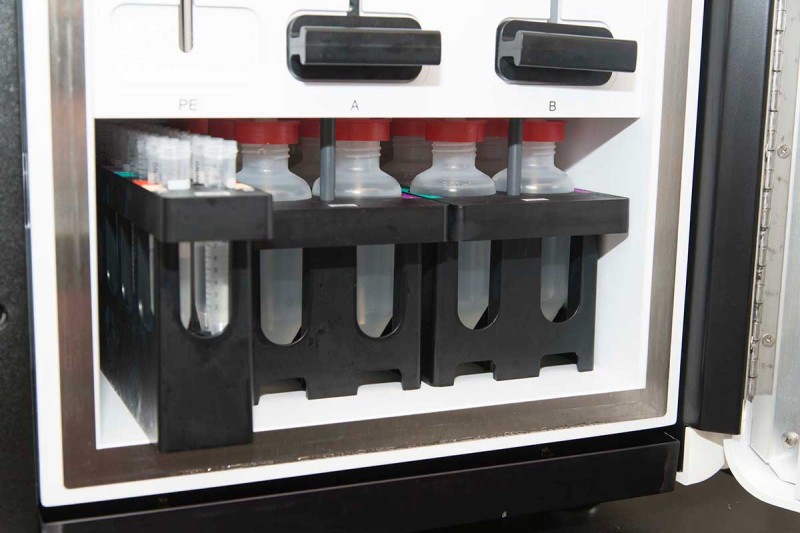
Sequencing circulating tumor cell-free DNA (cfDNA) in cerebrospinal fluid (CSF) improved diagnosis, decision-making, and clinical care in pediatric and adolescent and young adult (AYA) patients with brain tumors, according to clinical experience at Memorial Sloan Kettering Cancer Center (MSK) reported recently in Neuro-Oncology.
“We detected tumor-derived mutations in almost 50% of 64 CSF samples from 45 pediatric and AYA patients with primary and recurrent brain tumors using the Memorial Sloan Kettering-Integrated Mutation Profiling of Actionable Cancer Targets (MSK-IMPACT®) assay,” says Alexandra Miller, MD, PhD, lead author of the study and neuro-oncologist at MSK Kids. “To our knowledge, our study is the first that describes real-time implementation of CSF cfDNA testing using an assay that is Clinical Laboratory Improvement Amendments (CLIA)-certified by the New York State Department of Health for use in the clinical setting.”
“Sequencing CSF allowed us to make molecular diagnoses, assess responses to therapy in parallel with or before responses showed on imaging, and track the clonal evolution of tumors over time,” says Matthias Karajannis, MD, MS, chief of pediatric neuro-oncology at MSK Kids and senior author of the study. “Overall, one-third of the patients in our cohort directly benefited from CSF cfDNA analysis. Our findings support the broader implementation of clinical CSF cfDNA testing in pediatric and AYA patients with brain and spinal cord tumors to improve care.” (1)
Improving Brain Tumor Diagnosis
Brain tumors are among the leading causes of cancer-related death in pediatric and AYA patients. Sampling these tumors for diagnostic purposes is challenging, if not impossible, due to their anatomic location. This is particularly a problem in pediatric and AYA patients. There are significant unmet needs for early diagnosis and detection of minimal residual or recurrent disease — before confirmation of progression on imaging — for tailoring therapy and improving patient outcomes.
MSK researchers and others have shown that “liquid biopsy” sequencing assays can detect circulating tumor cfDNA in the CSF of patients with primary and secondary brain tumors.(1), (2), (3), (4), (5), (6) Other evidence has demonstrated that CSF sequencing is useful for tracking cancer cells’ clonal and genetic evolution and identifying targeted therapies.(7), (8) “However, most investigations to date have been conducted retrospectively using banked samples and focused on single types of brain tumors,” says Dr. Karajannis.
Key Study Findings and Implications
For the present study, MSK investigators prospectively collected 64 CSF samples from 45 individual patients seen at MSK Kids between May 2018 and November 2020. Patients had a variety of brain tumor subtypes, including high- and low-grade glioma, medulloblastoma, pineoblastoma, diffuse leptomeningeal glioneuronal tumor, retinoblastoma, and ependymoma. CSF was collected as part of clinical care via lumbar puncture or intraventricular access device, such as an Ommaya reservoir. Note that at MSK Kids, diagnostic lumbar punctures are only performed in a subset of patients as part of disease staging, typically within several weeks after surgical resection. (1)
The research team analyzed CSF and tumor samples using MSK-IMPACT, which at the time captured all protein-coding exons of 468 cancer-associated genes and select introns. (9) (Today, MSK-IMPACT analyzes 505 genes.) A sample was defined as “cfDNA-positive” if MSK-IMPACT detected at least one somatic variant, according to MSK’s previously established criteria for positive mutation calls and thresholds. (10) “Results went right into patients’ charts,” says Dr. Miller. “Clinicians and patients/families received CSF sequencing results within three to four weeks.”
All patients also underwent magnetic resonance imaging (MRI) according to standard of care. A board-certified radiologist with additional certification in neuroradiology and who was blinded to the CSF cfDNA results reviewed the MRI closest to CSF collection to identify the presence or absence of leptomeningeal dissemination. (1)
The investigators identified somatic alterations in 30 of 64 CSF samples (47%) and at least one sample per individual patient in 21 of 45 patients (47%). CSF cfDNA positivity was strongly associated with the presence of disseminated disease: 82% of samples from patients with disseminated disease were positive. Interestingly, there was no association between CSF cfDNA positivity and the timing of CSF collection during the disease course. (1) The authors speculate that this may be due to the small sample size.
“Based on our initial experience, CSF-based liquid biopsy provided clinical value in diagnosing and managing pediatric and AYA patients with brain tumors and should become more widespread,” says Dr. Karajannis. “Continuing technical advances in sequencing technologies will increase these benefits even further in the near future.”
Clinical Trials for Pediatric Patients With Brain Tumors
MSK Kids is currently conducting eight clinical trials for pediatric and AYA patients with primary brain tumors and one clinical trial for patients with leptomeningeal metastases in the brain and spine.
Note that within the phase 2 clinical trial investigating the addition of intraventricular omburtamab-based radioimmunotherapy to irinotecan, temozolomide, and bevacizumab in pediatric patients with recurrent medulloblastoma and ependymoma (NCT04743661), researchers are collecting CSF samples and analyzing cfDNA to track disease burden over time. For more information about this study and to inquire about eligibility, please contact 833-MSK-KIDS.
Meet Matthias Karajannis, MD, MS, Chief of Pediatric Neuro-Oncology at MSK
Advancing Research Through Multidisciplinary Collaboration
The study was made possible through a multidisciplinary collaboration among investigators from MSK, Columbia University Irving Medical Center, and Weill Cornell Medicine. MSK experts were from the Departments of Neurology, Pediatrics, Neurosurgery, Pathology, Radiology, and Epidemiology and Biostatistics, as well as the Center for Molecular Oncology and the Human Oncology and Pathogenesis Program.
The study was funded by support from the Matthew Larson Foundation for Pediatric Brain Tumors, the Marie-Josée and Henry R. Kravis Center for Molecular Oncology at MSK, and a National Cancer Institute Cancer Center Core Grant P30 CA008748. The investigators also thank Cycle for Survival®, the National Brain Tumor Society for research support, and The Scarlett Fund for their support to the Pediatric Translational Medicine Program at MSK.
Dr. Karajannis has received consulting and personal fees from AstraZeneca, Bayer, CereXis, QED Therapeutics, and Recursion Pharma. Dr. Miller reported no competing financial conflicts. Please refer to the paper for disclosures from other study authors.